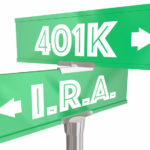
It's almost the start of a new year, as part of your new year's resolutions, you should consider investing in your 401k, if you aren't already doing it.
A 401k is a retirement savings plan offered by many employers. It allows employees to save and invest a portion of their income for their retirement years. Investing in a 401k can be a smart move for a number of reasons.
Reduce Taxable Income
First, contributing to a 401k can help reduce your taxable income. The money that you cont...
Read More


